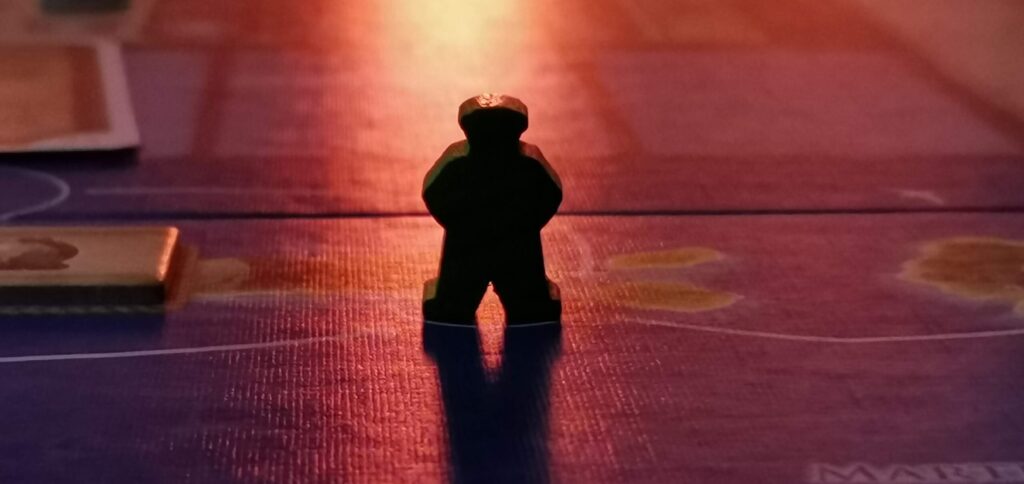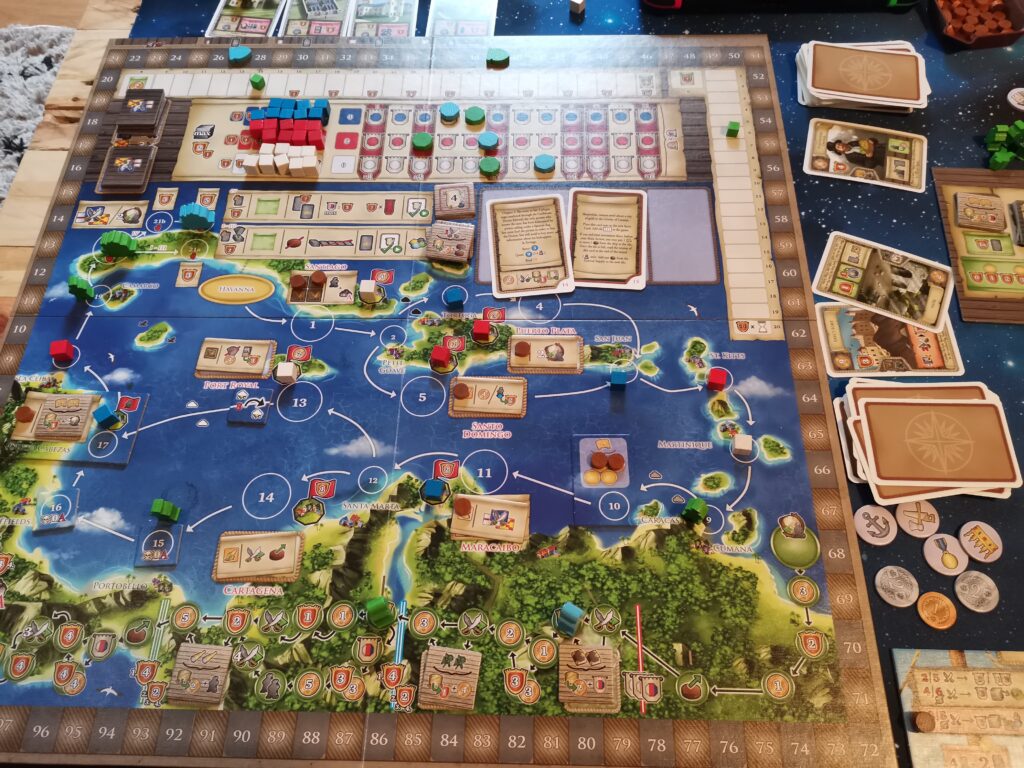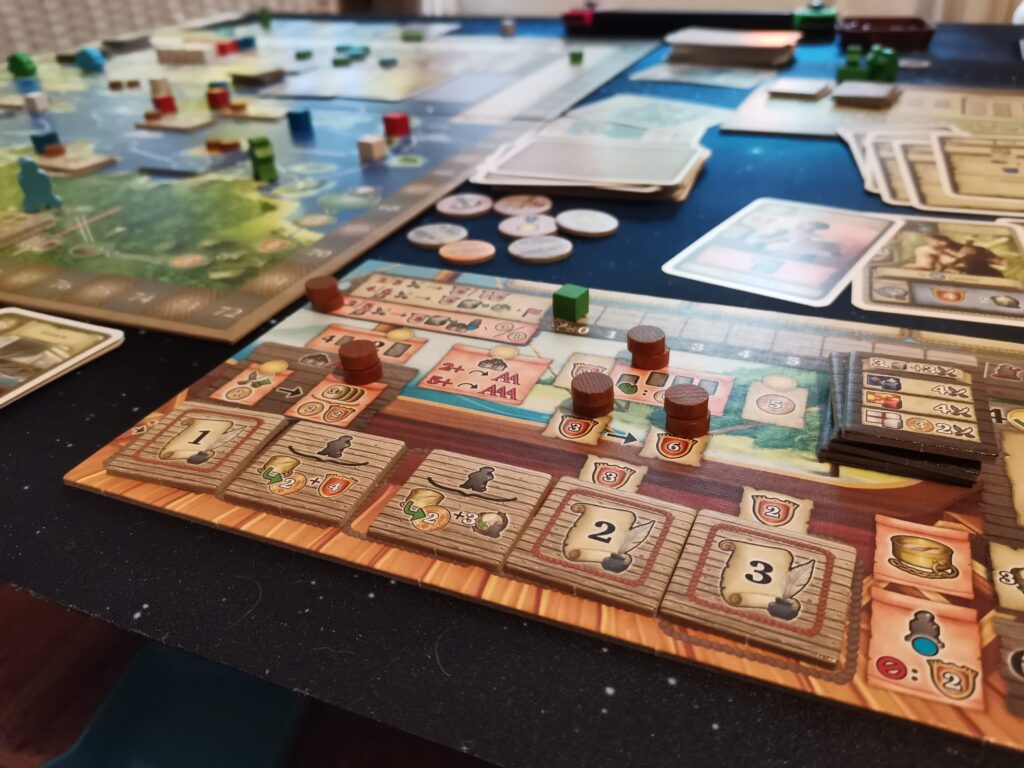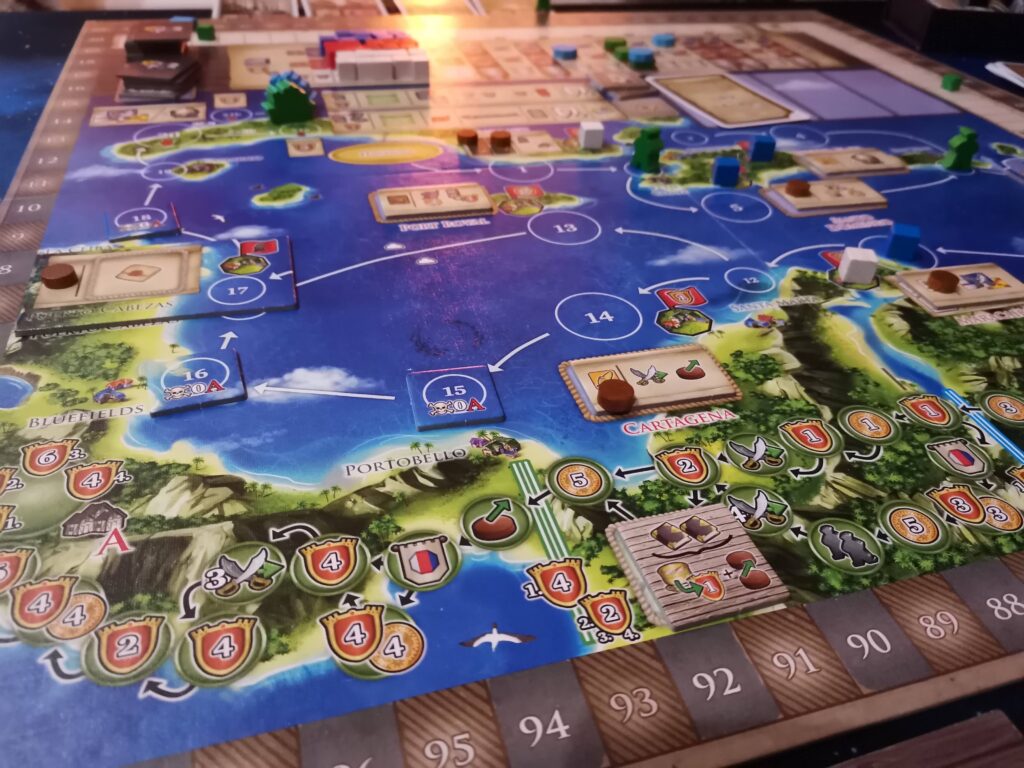There’s something about games set in tropical waters that I just love. I bought Merchants and Marauders back in the day, I was instantly drawn to Macao, I love Jamaica. So when I heard about a game set in the Caribbean, a Eurogame, one in the top 100 on BoardGameGeek, it was already pretty much a must-buy before I knew much about it.
Knowing it’s by renowned Austrian designer Alexander Pfister is a big plus. He’s more famous for his cow-centric smash Great Western trail, and you can really see the similarities between the two games. Racing laps around the board, choosing how many spaces to move, deciding when to use cards for currency, and when to save them.
| Game Details | |
|---|---|
/pic4917407.jpg) | |
| Name | Maracaibo (2019) |
| Player Count | 1-4 |
| Designer | Alexander Pfister |
| Artist | Fiore GmbH and Aline Kirrmann |
| Publisher | Game's Up, BoardM Factory, Capstone Games, dlp games, Ediciones MasQueOca, Fishbone Games, Geronimo Games, Hobby World, MeepleBR, Super Meeple, uplay.it edizioni, YOKA Games and テンデイズゲームズ(TendaysGames) |


What’s In The Box?
Maracaibo is a table hog. Even on a 3ft x 3ft table, expect to be pushed for space, but I think it’s justified. The board is really pretty, full of Caribbean islands and blue seas, jungle to explore, tracks for doubloons and VPs, space for story cards, quests, combat tokens, and a large track showing your influence over the competing nations.
Each player gets a ton of wooden pieces; a ship, ship crew, an explorer, cubes to track progress, and a seemingly endless supply of little wooden discs which act as both goods when you trade, and ship upgrades.
There are a lot of cards. A standard deck of ‘A’ cards are in use every game, with around half the deck of ‘B’ cards, along with any relevant story cards, and admiral cards (personal objectives which will influence how you play), to name a few.
The board and all card tokens are high quality, as are the wooden pieces. The player boards are thinner, but that’s to be expected if you’ve played anything from Castles of Burgundy to Terraforming Mars.


How Does it Play?
On every turn players move their ships 1-7 spaces around the board. Stopping at a city space lets you trade goods, which means you discard one of the cards in your hand with a matching symbol, and move a disc from your player board to the main board. There are lots of extra actions and rewards on your own player board, each covered with two discs, so clearing them by trading means you can do more each turn. Alternatively, you might stop at a village space, which lets you build cards from your hand, granting you permanent and end-of-game bonuses, or discard your hand in exchange for money. Or you may have upgraded your player board or bought cards which give you some new village actions.
You might want to move only one or two spaces per turn to maximise what you can do, but here’s the rub. If you move more spaces each turn, firstly you can get more than one village action per turn, but secondly whoever reaches the last spot on the lap – the finish line – triggers the end of round for everyone. The penalty for coming up with complicated plans is that you might never see them through to fruition.
There’s a lot going on at any one time in Maracaibo. Cards in-hand can be paid for to add to your tableau, but also used as goods to trade with to upgrade your ship, and they can also be used as items to claim quests. Maybe you want to increase your combat rank in order to fight with France, England or Spain to fight with them and increase your influence, aiming for VPs at the end. Maybe you concentrate on moving your explorer through the jungle and picking up bonuses that way. There’s a lot of variety in the way you approach the game.
Final Thoughts
It comes with a story/legacy mode which is brilliantly implemented. It adds new cards to buy, and using tiles overlaid on the board to add new locations, hazards and quests. It completely changes how you approach your games, and can be instantly reset to its vanilla state for a fresh game. The solo mode works with an automa opponent called Jean, who plays with a deck to randomly choose what they do each turn. Even this deck can be customised to make the game easier or more difficult. It’s a strong challenge and a great solo option.
It’s a brilliant game of balancing your own plans and those you think the other players might be doing. You can build engines which give you great bonuses, but if someone guesses what you’re up to, they can race around and trigger a round end and reset all the ships back to the start and deny you the chance to finish them. It’s medium-heavy weight, so not one to introduce new players to Euros, but once you understand the rules you’ll almost never need to look at the instructions again. It’s beautifully intuitive and all the information you need is right there on the table in front of you.
It’s not the cheapest game in the world, but it’s well worth the investment if you enjoy a chunky Euro and want a good solo game.
Be First to Comment